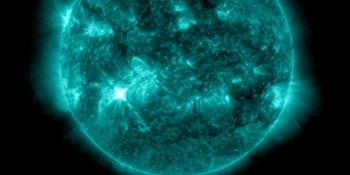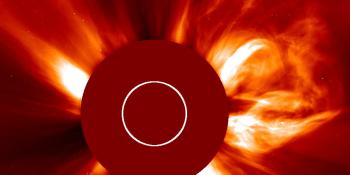Visualizzazione archivio di venerdì, 18 gennaio AM
Rapporto attività solare
Ogni brillamento solare menzionato nel rapporto ha un fattore di scala, applicato dal Centro di Predizione Meteorologica Spaziale (SWPC). A causa del fattore di scala del SWPC, i brillamenti solari sono segnalati come ridotti del 42%, rispetto ai dati di qualità scientifica. Il fattore di scala è stato rimosso dai nostri dati archiviati sui brillamenti solari, per riflettere le unità fisiche reali.
Rapporto dell'Attività Geofisica Solare 2013 Jan 18 2200 UTCPreparati dal SWPC della NOAA© ed elaborati da SpaceWeatherLive.com
Rapporto Congiunto USAF/NOAA dell'Attività Solare e Geofisica
SDF Numero 18 Emesso alle 2200Z il Jan 18 2013IA. Analisi delle Regioni Solari Attive e Attività dalle 2100Z-17 alle 2100Z-18 Solar activity has been at low levels for the past 24 hours.
The largest solar event of the period was a C5 event observed at
18/1707Z from Region 1654 (N07W59). There are currently 3 numbered
sunspot regions on the disk.
IB. Previsione dell'Attività Solare
Solar activity is expected to be low with
a slight chance for M-class flares on day one (19 Jan). Solar activity
is likely to be low on days two and three (20 - 21 Jan).
IIA. Sommario dell'Attività Geofisica dalle 2100Z-17 alle 2100Z-18
The geomagnetic
field has been at quiet to unsettled levels for the past 24 hours. Solar
wind speed, as measured by the ACE spacecraft, reached a peak speed of
480 km/s at 18/1850Z. Total IMF reached 17.2 nT at 18/1132Z. The maximum
southward component of Bz reached -9.3 nT at 17/2351Z. Electrons greater
than 2 MeV at geosynchronous orbit reached a peak level of 2057 pfu.
IIB. Previsione dell'Attività Geofisica
The geomagnetic field is expected
to remain mostly quiet until late on day one (19 Jan), when the
geomagnetic field increases to quiet to unsettled conditions with a
chance for an active period with the arrival of the 16 Jan CME.
Unsettled to active conditions with a slight chance for a minor storm
period exists early on day two (20 Jan) with the 16 Jan CME. Conditions
begin to decrease to predominately quiet to unsettled levels starting
midday on day two (20 Jan). Conditions are expected to return to
predominately quiet with a possible unsettled period on day three (21
Jan).
III. Probabilità dell'Evento dalle Jan del 19 alle Jan del 21
| Classe M | 10% | 05% | 01% |
| Classe X | 01% | 01% | 01% |
| Protone | 01% | 01% | 01% |
| PCAF | green | ||
IV. Flusso di 10.7 cm di Penticton
Osservato 18 Jan 115 Previsto 19 Jan-21 Jan 115/115/110 Media di 90 Giorni 18 Jan 122
V. Indici Geomagnetici A
Osservato Afr/Ap 17 Jan 012/015 Stimato Afr/Ap 18 Jan 009/009 Previsto Afr/Ap 19 Jan-21 Jan 009/012-015/018-007/012
VI. Probabilità dell'Attività Geomagnetica dal 19 Jan al 21 Jan
| A. Latitudini Medie | |||
|---|---|---|---|
| Attivo | 25% | 35% | 15% |
| Tempesta minore | 10% | 15% | 05% |
| Tempesta maggiore-grave | 01% | 05% | 01% |
| B. Latitudini Alte | |||
|---|---|---|---|
| Attivo | 15% | 10% | 15% |
| Tempesta minore | 30% | 30% | 25% |
| Tempesta maggiore-grave | 35% | 55% | 20% |
Tutti gli orari in UTC
<< Vai alla pagina della panoramica giornaliera
Ultime notizie
Ultimi messaggi dal forum
AR13936 8Coronal mass ejection impact and G4 geomagnetic storm 10 & 11 October 2024 935AR 3938 21AR 13933 9AR 13932 89
Altri argomentiSupporta SpaceWeatherLive.com!
Molte persone vengono su SpaceWeatherLive per seguire l'attività del Sole o sapere se ci sia la possibilità di vedere l'aurora, ma a maggior traffico corrispondono costi maggiori. Considerate una donazione se vi piace SpaceWeatherLive così che possiamo mantenere online il sito web!

Notizie sul meteo spaziale
| Ultimo brillamento X | 2024/12/08 | X2.2 |
| Ultimo brillamento M | 2024/12/26 | M7.3 |
| Ultima tempesta geomagnetica | 2024/12/17 | Kp5+ (G1) |
| Giorni senza macchie | |
|---|---|
| Ultimo giorno senza macchie | 2022/06/08 |
| Media mensile Numero di Macchie Solari | |
|---|---|
| novembre 2024 | 152.5 -13.9 |
| dicembre 2024 | 119.3 -33.2 |
| Last 30 days | 122 -35.7 |


